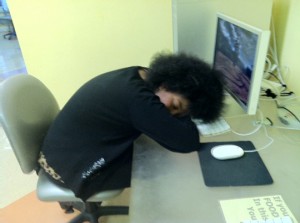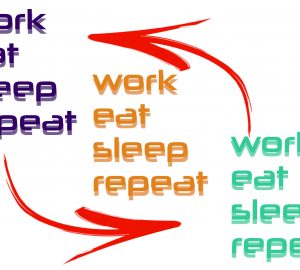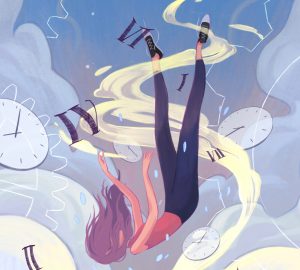
If there is one thing all college students are familiar with, it’s sleep deprivation. Especially at SCAD, students face long nights working until their morning classes. For second-year advertising student Aurie Singletary, sleep comes more often.
Singletary suffers from the chronic sleep disorder narcolepsy. Narcolepsy is a condition that makes its victims excessively tried. So tired, in fact, that the body unwillingly prompts itself to fall asleep, regardless of location or time.
What is curious about this condition is the fact that while the body is asleep, the mind remains fully alert. “When I’m having an episode, I’m always aware of what is happening around me, which is usually panic,” said Singletary. She has been affected by narcolepsy since her junior year of high school, where she would experience episodes every couple of weeks. “At the beginning, I could tell when an episode was about to happen,” said Singletary. “It would make me feel nauseous, and just generally sick.”
As time has gone on, however, her body no longer warns her when she is about to fall asleep. In addition to narcolepsy, Singletary has a condition called Cataplexy, which causes the muscles in her body to become limp and flaccid, like Jell-O.
With her uncertain sleep schedule, Singletary plans and manages her time around having to sleep voluntarily in between classes. “I’m on a really weird schedule,” said Singletary. “In the morning I have to coax myself awake. I get up two hours before my first class, but I spend an hour just trying to get up. During the day I usually sleep after my 11 a.m. and 2 p.m. classes and don’t wake up until dinner. I don’t mind having to sleep so much. Before I was diagnosed, napping was one of my favorite things to do, so I’m glad now I have an excuse.”
Since her diagnosis, Singletary has started taking a medication called Provigil, which is used to fight the excessive fatigue she experiences through the day. But it is not a cure for narcolepsy. “The Provigil keeps a normal person up for three days straight,” said Singletary. “The military uses it. For me, it’s about seven hours. I have a few tricks though. I try not to eat warm, heavy food during the day and just snack on cold things. Warm foods make me sleepy.”
There is not much Singletary can do about the condition for now, so instead of moping, she makes light of her situation and tries to comfort those around her. “I always inform peers and professors about my condition, because I’ll pass right out. Just roll me in the corner and let me sleep. I know it can look really scary, but I’m usually alright. I’m just asleep! Who doesn’t want to take naps?”
Being a student at SCAD has made her condition both more difficult to deal with and a reason for her to learn to manage it. “At the beginning of SCAD the stress would trigger episodes more frequently, but I’ve gotten a lot better at managing that stress. I don’t have my license yet, but I’m slowing learning and will only drive when I’m feeling 100 percent and with the company of someone else, in case something does happen.”























